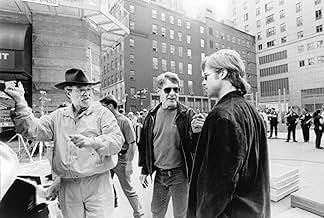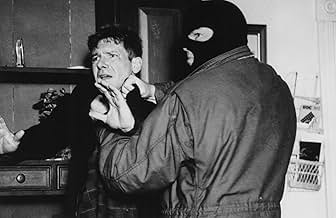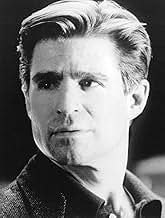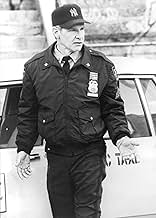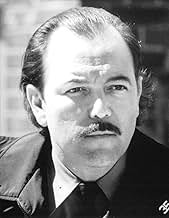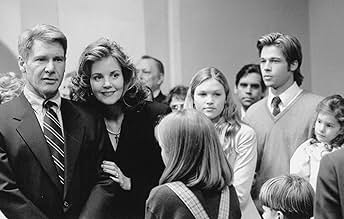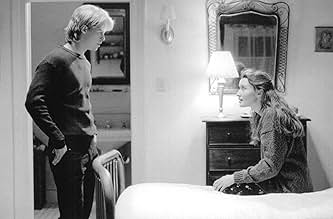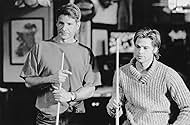Un miembro del IRA escapa a Nueva York y se esconde en la casa de un policía de pleno derecho que desconoce su identidad. El recién llegado se integra a la familia, mientras organiza una gra... Leer todoUn miembro del IRA escapa a Nueva York y se esconde en la casa de un policía de pleno derecho que desconoce su identidad. El recién llegado se integra a la familia, mientras organiza una gran compra de armas para su organización.Un miembro del IRA escapa a Nueva York y se esconde en la casa de un policía de pleno derecho que desconoce su identidad. El recién llegado se integra a la familia, mientras organiza una gran compra de armas para su organización.
- Dirección
- Guionistas
- Elenco
- Premios
- 1 nominación en total
Rubén Blades
- Edwin Diaz
- (as Ruben Blades)
Ashley Acarino
- Morgan O'Meara
- (as Ashley Carin)
Opiniones destacadas
Frankie McGuire (Brad Pitt) is one of the IRA's deadliest assassins. But when he is sent to the United States to buy weapons, specifically Stinger missiles, Frankie stays with the family of Tom O'Meara (Harrison Ford), a New York police officer who is happily married to Sheila (Margaret Colin) with children , but all of them know nothing about Frankie's true identity. A surprising friendship emerges, but Tom's growing suspicions force Frankie to choose between the promise of peace or a life of murder. A man trapped by destiny and another bound by duty! They are about to discover why they are willing to fight and die. They come from different worlds. They fight for different causes. Now, two men from opposite sides of the law are about to go to war !.
An interesting thriller on the typical theme of hidden identity, as a police officer discovers the true identity of his guest in the house, a member of the I. R. A. Hidden terrorist. This is more of a detailed character study, trying to explore the reasons why the protagonists act the way they do, rather than the typical action movie. This is a good suspense drama devised by screenwriter Kevin Jarre (Glory) and well directed by Alan J. Pakula in which an interpretive duel is established between two of the biggest screen stars belonging to two different generations: Harrison Ford (Patriotic Games, Star Wars, Sabrina) and Brad Pitt (Seven, The Curious Case of Benjamin Button, Legends of the fall), the latter doing his usual job as an honest patrol cop who gets caught up in bad situations. Harrison Ford was paid $20 million to star in the film and Brad Pitt earned $12 million; the difference in salaries came because the status of first big star was higher for Ford who had recently played the successful Indiana Jones sequels, while Brad Pitt did not yet have the status that he would subsequently achieve. They are well accompanied by a good supporting cast with some familiar faces, such as: Margaret Colin, Rubén Blades, Treat Williams, George Hearn, Mitchell Ryan, David O'Hara and Natascha McElhone.
This features an evocative musical score by prestigious composer James Horner who strives to give the film a tone full of Irish sounds. Adding colorful and appropriate photography by the classic cameraman Gordon Willis who photographed The Godfather and other very important films. This gripping story was professionally directed by Alan J. Pakula, although it has some cracks and is a bit slow. Alan J. Pakula was chosen to direct because he was the only person both Harrison Ford and Brad Pitt agreed should do it, but it turned out to be the last film Pakula finished before his death caused by a car accident. This compelling American film director, writer and producer was nominated for three Academy Awards: Best Picture for "To Kill a Mockingbird" (1962), Best Director for "All the President's Men" (1976) and Best Adapted Screenplay for ¨Sophie's Choice¨ (1982). His producing business partner in the 1950s and 1960s was Robert Mulligan. Pakula was always very supportive of his cast and had a reputation as an "actor's director." He achieved several hits such as ¨The Devil's Shadow¨, ¨Pelican Report¨, ¨Presumed Innocent¨, ¨Sophie's Choice¨, ¨Klute¨ and some failures such as ¨Starting Over¨, ¨See You in the Morning¨ and ¨ The last witness¨ or ¨The Parallax View¨. Rating: 7/10. It is worth seeing and being better than average thanks to the magnificent performances of Harrison Ford and Brad Pitt.
An interesting thriller on the typical theme of hidden identity, as a police officer discovers the true identity of his guest in the house, a member of the I. R. A. Hidden terrorist. This is more of a detailed character study, trying to explore the reasons why the protagonists act the way they do, rather than the typical action movie. This is a good suspense drama devised by screenwriter Kevin Jarre (Glory) and well directed by Alan J. Pakula in which an interpretive duel is established between two of the biggest screen stars belonging to two different generations: Harrison Ford (Patriotic Games, Star Wars, Sabrina) and Brad Pitt (Seven, The Curious Case of Benjamin Button, Legends of the fall), the latter doing his usual job as an honest patrol cop who gets caught up in bad situations. Harrison Ford was paid $20 million to star in the film and Brad Pitt earned $12 million; the difference in salaries came because the status of first big star was higher for Ford who had recently played the successful Indiana Jones sequels, while Brad Pitt did not yet have the status that he would subsequently achieve. They are well accompanied by a good supporting cast with some familiar faces, such as: Margaret Colin, Rubén Blades, Treat Williams, George Hearn, Mitchell Ryan, David O'Hara and Natascha McElhone.
This features an evocative musical score by prestigious composer James Horner who strives to give the film a tone full of Irish sounds. Adding colorful and appropriate photography by the classic cameraman Gordon Willis who photographed The Godfather and other very important films. This gripping story was professionally directed by Alan J. Pakula, although it has some cracks and is a bit slow. Alan J. Pakula was chosen to direct because he was the only person both Harrison Ford and Brad Pitt agreed should do it, but it turned out to be the last film Pakula finished before his death caused by a car accident. This compelling American film director, writer and producer was nominated for three Academy Awards: Best Picture for "To Kill a Mockingbird" (1962), Best Director for "All the President's Men" (1976) and Best Adapted Screenplay for ¨Sophie's Choice¨ (1982). His producing business partner in the 1950s and 1960s was Robert Mulligan. Pakula was always very supportive of his cast and had a reputation as an "actor's director." He achieved several hits such as ¨The Devil's Shadow¨, ¨Pelican Report¨, ¨Presumed Innocent¨, ¨Sophie's Choice¨, ¨Klute¨ and some failures such as ¨Starting Over¨, ¨See You in the Morning¨ and ¨ The last witness¨ or ¨The Parallax View¨. Rating: 7/10. It is worth seeing and being better than average thanks to the magnificent performances of Harrison Ford and Brad Pitt.
What is it with American-Irish? Some of their richest and most respectable members have poured millions of Dollars into the IRA, harboured some of their members, idealised the notion of a "fight for freedom". Believe me, as a Scot, with William Wallace et al I've always had a certain affinity for heroes. But the IRA are no heroes. They've become Northern Ireland's drug-dealers, extortioners, gangsters. The people of Ireland as whole have had enough of them and their way of terrorising innocent people. May it be the IRA or the UDP, the notion of a Catholic V Protestant jihad has long ago turned into a simple cycle of self-perpetuating violence. These men and women are no longer anything resembling the oh-so glorious Michael Collins, they are terrorists who don't know when to quit and never knew anything but how to fight. These men aren't the Brad Pitts of the world, nor is the British Army an oppressor anymore (considering that over 90% of the locals support the Army, simply because it provides protection). Yet in 1997 we still got the great toss of this movie, showing us how brave Irishmen fight against an onslaught of British stormtroopers and evil S(I)S men. Somehow it seems that America is hell-bent on keeping up the idea of the stiff upper-lip English villain. May it be The Devil's Own, Braveheart, U-571 or most recently The Patriot, Hollywood seems bent on demonising the US' closest ally, both politically and culturally. I may not be a great fan of the English, but even I know what harm stereotypes can do. Perhaps the writer should have gone out to the streets of Belfast and asked ordinary people what they think of the IRA. Perhaps the writer should have also approached a soldier and asked him what it's like to occupy Northern Ireland. Somehow, I have severe doubts that a movie about the post-WW2 SS-"Werwölfe" guerillas would be quite so romanticised.
And this movie has a Riverdance sequence. Oh please....
And this movie has a Riverdance sequence. Oh please....
Starring big stars Harrison Ford and Brad Pitt The Devil's Own is a strange film- While The Devil's Own doesn't do a spectacular job of fulfilling the promise of its cast or its complex politics-and-guns premise, it is nevertheless reasonably well-paced. The less intently you watch this movie, the greater the chance that you'll be pleased by it. Unfortunately, if you're paying attention, it won't take long to notice that very little of the last act holds together. That sort of high-tension, mind-numbing climax makes it difficult for me to retain more than token enthusiasm for the production as a whole. Pitt and Ford do credible jobs as Frankie and Tom. Despite his character's brutal, bloody past, Pitt manages to capture our sympathy, in large part because, aside from the killings, Frankie seems like a likable sort of guy. Ford, in a role that's a far cry from the cocky Han Solo, recalls Jack Ryan, the protagonist of Patriot Games and Clear and Present Danger -- a hero whose armor is just a little too shiny.
As a child in Ireland, Frankie McGuire (Brad Pitt) sees his dad gunned down for his involvement with the Irish Republican Army (IRA). As an adult, McGuire has followed in his dad's footsteps. When the IRA decides it needs more firepower, they hatch a plan that involves McGuire going to the United States to pick up a shipment of Stinger missiles. Through American IRA contacts, McGuire adopts a false identity and housing is arranged with a non-involved Irish family headed by New York City cop Tom O'Meara (Harrison Ford).
There is an impression that The Devil's Own is an action film. The Internet Movie Database has it listed as "Action/Drama/Thriller". Although there are some action elements in the film, this is really a tragic drama, almost in a classical sense, and it's best to approach the film with only that genre in mind. The plot is fairly complex and the film tends to move slowly--much more slowly than a typical actioner or thriller.
The heart of the story is McGuire's relationship with O'Meara and his family. All of the other material--the IRA stuff, the mob and terrorist stuff, the New York City cop stuff, and so on, are not the focus. Those elements are present to help establish characterization, to build the relationship and understanding between McGuire and O'Meara, and to provide a justification for the developments in the film, and particularly the conclusion, which all have poignant things to say about the decisions that we make and why we make them.
The film largely succeeds if seen from this dramatic perspective. It's not quite a 10, however, as it always seems slightly distanced from the viewer. It's an 8 out of 10 for me.
(This comment was originally posted on January 16, 2005 and ended with the above. The following was added much later after reading through some other user comments:) We should not forget that even though it takes elements from the real world to construct its story, The Devil's Own is NOT intended to be journalistic or a documentary. There is no claim that it is giving an accurate portrayal of political situations, and it's not intended to campaign for one side or another in a real-world political situation. This is fiction, folks, and should be judged _as fiction_. For that, you should forget about what you know of the real world, and assess the story, images and sounds you experience from your television. Does the story work as a self-contained entity? Are the performances good? Is it visually attractive/rewarding? Those are the kinds of things we should be judging.
For me, The Devil's Own succeeded as a drama about relationships, with its poignancy arrived at primarily by making two people from very different worlds, with very different outlooks, learn to see things from different perspectives.
That's great if you're very knowledgeable about Northern Ireland in the real world and if you have strong opinions about terrorism. However, your knowledge and opinions on that stuff have nothing to do with this film.
There is an impression that The Devil's Own is an action film. The Internet Movie Database has it listed as "Action/Drama/Thriller". Although there are some action elements in the film, this is really a tragic drama, almost in a classical sense, and it's best to approach the film with only that genre in mind. The plot is fairly complex and the film tends to move slowly--much more slowly than a typical actioner or thriller.
The heart of the story is McGuire's relationship with O'Meara and his family. All of the other material--the IRA stuff, the mob and terrorist stuff, the New York City cop stuff, and so on, are not the focus. Those elements are present to help establish characterization, to build the relationship and understanding between McGuire and O'Meara, and to provide a justification for the developments in the film, and particularly the conclusion, which all have poignant things to say about the decisions that we make and why we make them.
The film largely succeeds if seen from this dramatic perspective. It's not quite a 10, however, as it always seems slightly distanced from the viewer. It's an 8 out of 10 for me.
(This comment was originally posted on January 16, 2005 and ended with the above. The following was added much later after reading through some other user comments:) We should not forget that even though it takes elements from the real world to construct its story, The Devil's Own is NOT intended to be journalistic or a documentary. There is no claim that it is giving an accurate portrayal of political situations, and it's not intended to campaign for one side or another in a real-world political situation. This is fiction, folks, and should be judged _as fiction_. For that, you should forget about what you know of the real world, and assess the story, images and sounds you experience from your television. Does the story work as a self-contained entity? Are the performances good? Is it visually attractive/rewarding? Those are the kinds of things we should be judging.
For me, The Devil's Own succeeded as a drama about relationships, with its poignancy arrived at primarily by making two people from very different worlds, with very different outlooks, learn to see things from different perspectives.
That's great if you're very knowledgeable about Northern Ireland in the real world and if you have strong opinions about terrorism. However, your knowledge and opinions on that stuff have nothing to do with this film.
I love movies from this timeperiod. They carry a vibe that's gone in modern day movies. Different camera action, less pace (even action movies) and a different psychology of the characters. TDO is not the best movie of it's genre, but Ford and Pitt bring a lot of weight to it. Pitt is charming as always, but is also convincing portraying a ruthless IRA commander. A decent script, lovely irish accents and convincing motives for the characters make this a nice movie for a sunday afternoon.
¿Sabías que…?
- TriviaBrad Pitt wanted to leave the production, but was threatened by a lawsuit. In the February 2, 1997, issue of Newsweek, Pitt called the film a "disaster", and said that "it was the most irresponsible bit of filmmaking - if you can even call it that - that I've ever seen. I couldn't believe it". Rumors of fighting on the set (especially over which star would be the focus of the film) plagued the production. The original script was discarded and there were at least seven subsequent rewrites. Pitt said the final version was "a mess". "The script that I had loved was gone," he said. "I guess people just had different visions and you can't argue with that. But then I wanted out and the studio head said, 'All right, we'll let you out, but it'll be $63 million for starters." (Harrison Ford later noted that Pitt "forgot for a moment that he was talking to someone whose job it was to write this s*** down".)
- ErroresWhen taking Rory/Frankie in to the police station, Tom and his partner leave him alone, though handcuffed, in the rear seat. It is standard police practice to have one officer in back with the suspect, and seated directly behind the driver. This prevents any assault on the driver, or attempt to escape without being observed - or seen too late by way of the rear view mirror as happened here.
Selecciones populares
Inicia sesión para calificar y agrega a la lista de videos para obtener recomendaciones personalizadas
- How long is The Devil's Own?Con tecnología de Alexa
Detalles
Taquilla
- Presupuesto
- USD 90,000,000 (estimado)
- Total en EE. UU. y Canadá
- USD 42,868,348
- Fin de semana de estreno en EE. UU. y Canadá
- USD 14,274,503
- 30 mar 1997
- Total a nivel mundial
- USD 140,807,547
- Tiempo de ejecución
- 1h 51min(111 min)
- Color
- Mezcla de sonido
- Relación de aspecto
- 2.39 : 1
Contribuir a esta página
Sugiere una edición o agrega el contenido que falta




